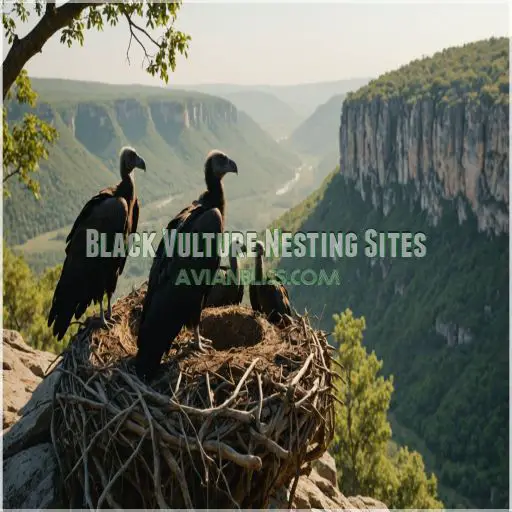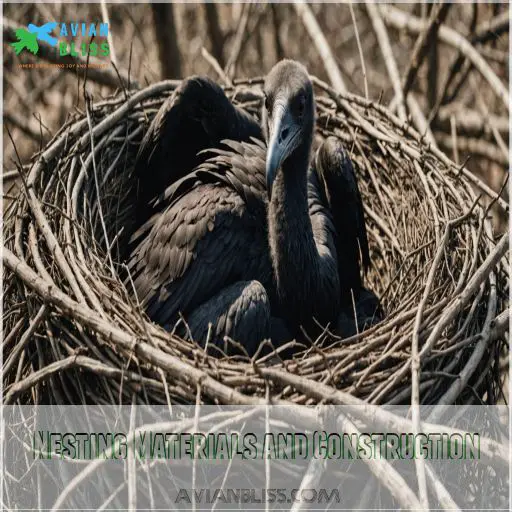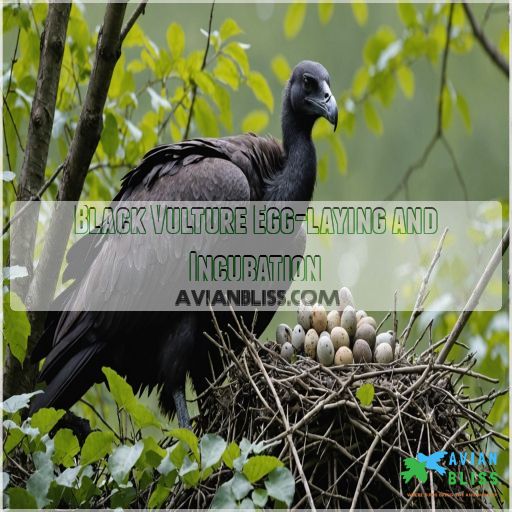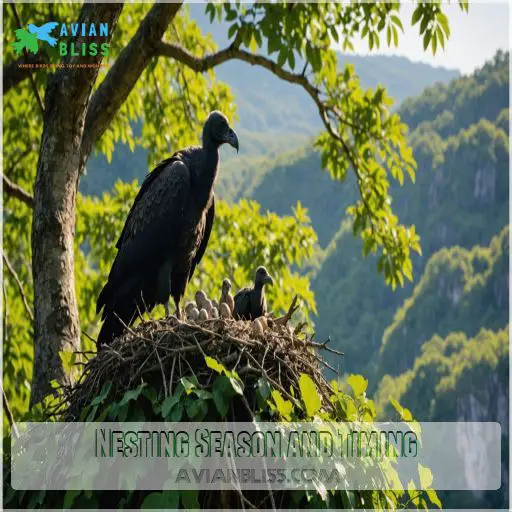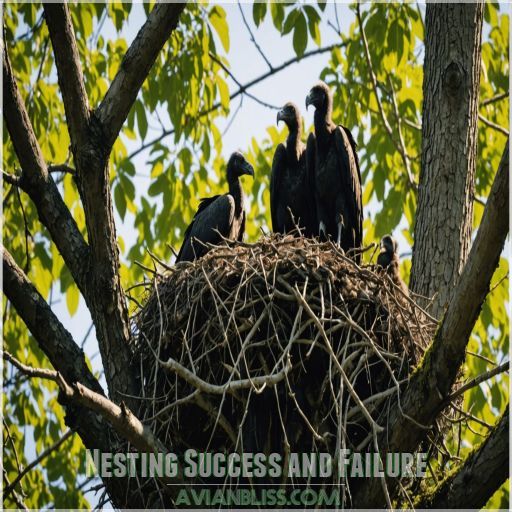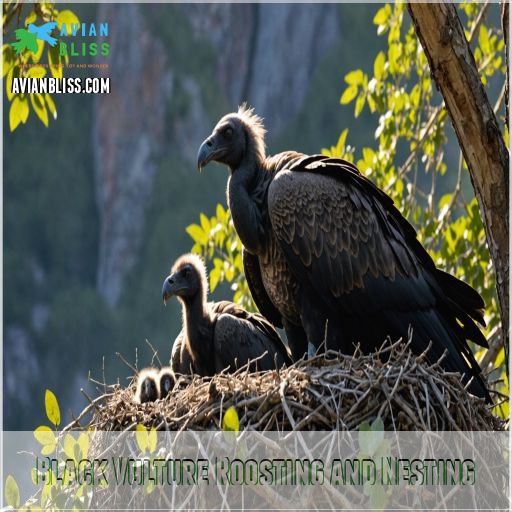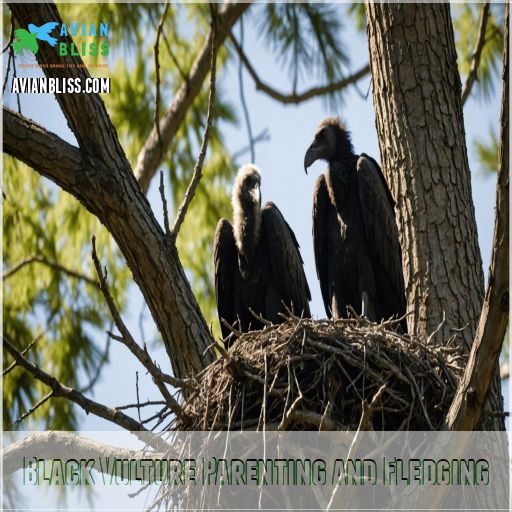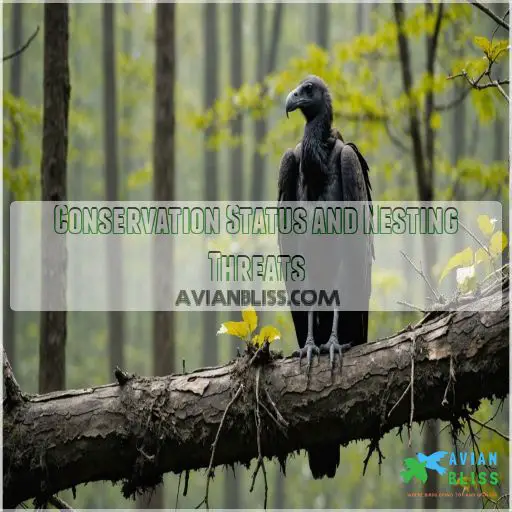This site is supported by our readers. We may earn a commission, at no cost to you, if you purchase through links.
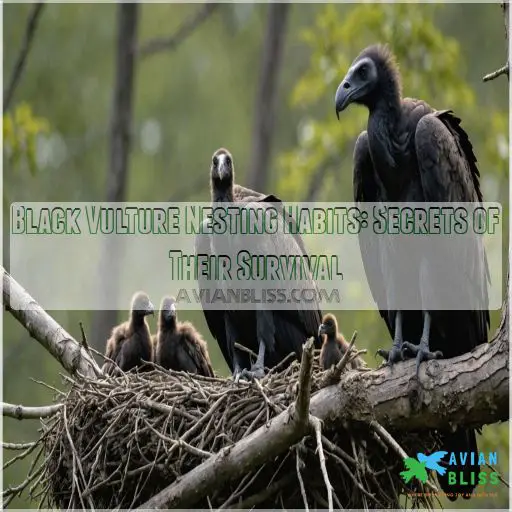 Black vulture nesting habits are far from fancy. These birds are the ultimate minimalists in terms of home decor. You’ll find them setting up shop in dark, cozy spots like tree cavities, abandoned buildings, or even rocky crevices. No need for HGTV here – they simply plop their eggs on whatever surface is available. Talk about low-maintenance!
Black vulture nesting habits are far from fancy. These birds are the ultimate minimalists in terms of home decor. You’ll find them setting up shop in dark, cozy spots like tree cavities, abandoned buildings, or even rocky crevices. No need for HGTV here – they simply plop their eggs on whatever surface is available. Talk about low-maintenance!
Both parents share nest duties, from egg-laying to incubation. Their breeding season kicks off in spring, but timing can vary depending on location and climate.
These feathered families fiercely defend their nests, using tactics that’d make any home security system jealous. But there’s more to their nesting story than meets the eye… They fiercely defend their nests and have a breeding season that kicks off in spring.
Table Of Contents
- Key Takeaways
- Black Vulture Nesting Sites
- Nesting Materials and Construction
- Black Vulture Egg-laying and Incubation
- Nesting Season and Timing
- Black Vulture Nesting Behavior
- Nesting Success and Failure
- Black Vulture Roosting and Nesting
- Nesting Territories and Home Range
- Black Vulture Parenting and Fledging
- Conservation Status and Nesting Threats
- Frequently Asked Questions (FAQs)
- How do black vultures build a nest?
- Where do black vultures nest?
- Where do black vultures nest and lay their eggs?
- How long does a black vulture nest last?
- Where do black vultures roost and nest?
- Do black vultures keep or defend nesting territories?
- What time of year do black vultures lay eggs?
- What does a Black Vulture nest look like?
- Do vultures nest in the same place every year?
- Are black vultures aggressive?
- How do black vultures communicate during nesting?
- Do black vultures reuse nests in subsequent years?
- How do nestlings defend themselves from predators?
- Whats the average lifespan of wild black vultures?
- How far do black vultures travel for food?
- Conclusion
Key Takeaways
- You’ll be amazed by black vultures’ minimalist nesting habits – they simply plop their eggs on whatever surface is available, with no need for fancy home decor.
- These feathered families fiercely defend their nests, using tactics that would make any home security system jealous. But don’t worry, their breeding season kicks off in the spring, so you’ll have plenty of time to admire their parenting skills.
- Black vultures are the MacGyvers of the avian world, choosing nesting spots that balance safety and convenience, from hollow trees to abandoned buildings. They’re true masters of adaptability.
- Even though black vultures don’t build traditional nests, they’re dedicated parents who share incubation duties and continue feeding their young long after they’ve fledged. Talk about a family that sticks together.
Black Vulture Nesting Sites
When you think of Black Vultures nesting, imagine them setting up camp in hollow trees, cozying up in abandoned buildings, or even going ground-level for their nests.
These resourceful birds have a knack for choosing spots that balance safety and convenience, making them the MacGyvers of the avian world.
Types of Trees and Cavities Used
Black Vultures choose nesting sites in varied trees, preferring large, old, and often dead trees for their cavities.
They don’t fuss with building traditional nests, instead simply laying eggs directly on the surface.
Tree cavities are usually dark and sheltered, offering safety and seclusion.
These adaptable birds use hollow trees, including oaks and sycamores, for nesting .
Abandoned Buildings and Other Man-made Structures
When it comes to nesting, you might be surprised that black vultures sometimes pick abandoned buildings. It’s like their version of an urban penthouse!
These structures offer:
- Protection from predators.
- Persistent nesting sites for multiple seasons.
- Human impact creates new nesting options.
Despite safety concerns, the adaptability of these birds is both impressive and amusing.
Ground-level Nesting Sites
Even though black vultures, or Coragyps atratus, don’t build nests, they choose hidden ground-level sites like hollow logs or thickets.
Despite potential ground-level predators and human impact, these spots offer camouflage.
Habitat changes challenge nesting habits, yet similar species adapt differently, like those seen in owl tree cavities owl tree cavities
.
With conservation efforts, these resilient birds remind us of nature’s knack for survival in unexpected places (Source).
Nesting Materials and Construction
In terms of building their nests, black vultures don’t mess around.
These savvy scavengers use a variety of twigs, leaves, and other plant materials to construct their cozy abodes, much like cardinals use twigs, grass, and bark to build their cup-shaped nests
.
With both parents pitching in to get the job done, they work together efficiently.
Twigs, Leaves, and Other Plant Material Used
You might be surprised by the Black Vulture’s nesting material choices. These resourceful birds prefer practical selections like:
- Twigs for sturdy support.
- Leaves to cushion and insulate.
- Grass for additional warmth and comfort.
- Odd bits of litter—yes, recyclers at heart!
Their material preference varies regionally, reflecting their adaptability in nest structure and parental care.
Arrangement and Shape of the Nest
Black vultures have a unique approach to nest construction—there isn’t one.
They favor simple nesting sites like tree cavities or abandoned buildings where eggs are laid directly on the substrate.
This minimalist "real estate" philosophy helps them focus on key activities like nest defense and caring for hatchlings, rather than elaborate arrangements.
Role of Both Parents in Nest Building
Picture parent vultures, like construction buddies, organizing their ground-level homes. They unite in nest teamwork, though their cooperative nesting isn’t grand; it’s endearing.
You can’t miss their shared responsibilities:
- Choose locations: They prefer dark, abandoned spots.
- Lay eggs on debris: Marvel at their simplicity.
- Guard loyally: They’re protective partners.
- Feed and incubate eggs: Keep the nest bustling with future turkey vultures and condors.
Black Vulture Egg-laying and Incubation
If you’ve ever wondered how Black Vultures pull off parenting, it’s all about teamwork and patience.
These birds lay two eggs that look like odd Easter eggs, and they share incubation duties with a daily commitment resembling a relay race—minus the track shoes.
Number of Eggs Laid and Frequency
Nest building’s complete; what’s next? In black vulture families, the female typically lays two eggs annually.
They might surprise you with a clutch size variation, but two’s the usual.
Check out this egg-laying breakdown:
| Topic | Description |
|---|---|
| Egg-laying frequency | Once a year |
| Clutch size | Usually two |
| Rare occurrences | Three-four eggs max |
| Nesting success rate | Fairly high |
| Egg viability | Quite resilient |
Incubation Period and Parental Responsibilities
As the black vulture pair lays their two eggs on bare ground, both parents share egg care duties and nest defense responsibilities.
With a keen eye on chick feeding and parental bonds, they balance keeping intruders at bay.
This vigilant partnership continues until the fluff-covered fledglings find their independence, like students venturing off to explore new horizons.
Egg Coloration and Patterns
While black vulture eggs can range from pale white to greenish, they always feature distinctive dark-brown blotches.
This camouflage helps conceal the eggs from predators, giving the hatchlings a better chance at survival.
Both parents take turns incubating the eggs for over a month before the young emerge, ready to be fed and cared for by their devoted family.
Nesting Season and Timing
You might think you’ve got your timing perfected, but Black Vultures have their own schedule.
These savvy scavengers consider the time of year and environmental factors, ensuring they’ve picked the right moment for a successful nesting season.
Time of Year for Breeding and Nesting
When you’re thinking about black vultures’ timing for breeding and nesting, three key points stand out:
- Breeding season kicks off from February to May, but varies by region.
- Climate change can shift nesting timing unexpectedly.
- Habitat availability impacts when and where they settle down.
Consider these as nature’s quirky calendar alerts!
Factors Influencing Nesting Season
You’ve got a recipe for Black Vulture nesting timed just right to tackle life’s challenges.
Climate change and human disturbances play sneaky roles, shifting sweet spots for nesting. Food availability, predator pressure, and habitat loss are like the vultures’ unwelcome pests, urging them to adapt cleverly.
It’s bird versus environment in a nesting showdown!
Duration of Nesting Season
Understanding the black vulture’s nesting season length is a bit like predicting weather—full of uncertainty!
Typically, it lasts about four months, from egg-laying to fledging. Climate impacts, food availability, and breeding success play significant roles.
Imagine young vultures practicing their flight moves before confidently taking off. These factors influence hatching time and help their young thrive.
Black Vulture Nesting Behavior
When you’re observing Black Vultures, you’ll notice they’re fiercely protective of their nesting sites.
These birds aren’t just about defending territory; they’re also dedicated partners, sticking together as a family team.
It’s like having a lifelong buddy to guard the snacks!
Aggressive Defense of Nesting Sites
Black vultures, with their fierce loyalty, defend their nests like seasoned warriors. They’ll even vomit foul-smelling material at predators—a nest defense tactic you’d rather not witness!
- Bellowing Hisses: Audible deterrent for unwelcome visitors.
- Wing Flapping: Intimidates and startles potential threats.
- Swooping Attacks: Dive-bombing to protect young.
- Cooping Defense: was corrected to – Cooperative Defense: Both parents participate in safeguarding their territory.
Territorial Behavior and Boundaries
Territorial disputes are common among black vultures, as they fiercely defend their nesting boundaries.
These birds establish clear boundaries around their roosting and breeding sites, engaging in aggressive displays and vocalizations to ward off intruders.
Neighboring pairs may even clash directly, using their powerful beaks and talons to assert dominance .
Maintaining these territories is essential for securing resources and ensuring successful nesting. It is a key aspect of the birds’ overall survival strategy, and they will fiercely defend their territories at all costs.
Social Structure and Pair Bonding
Many black vultures form tight-knit family groups with a remarkable social structure.
You’ll find these "highly social birds with fierce family loyalty" (Source) engaging in fascinating behaviors:
- Lifelong pair bonds
- Cooperative feeding of young
- Extended care for fledglings
- Shared roosting with relatives
These feathered friends aren’t just scavengers; they’re family-oriented creatures that’ll warm your heart. Their social bonds help them thrive, proving that even Nature’s cleanup crew knows the value of sticking together.
Nesting Success and Failure
You’re about to uncover the secrets behind black vulture nesting success and failure. From environmental factors to human impacts, you’ll learn what makes or breaks these birds’ breeding efforts.
Factors Affecting Nesting Success
Black vulture nesting success relies on a complex web of factors.
Suitable nesting sites are crucial for these scavenging birds. They thrive in caves, hollow trees, or abandoned buildings.
Another key factor is the availability of food sources nearby. Minimal human disturbance also contributes to their success.
Climate conditions play a role in their nesting success too. They influence both food availability and nesting comfort for black vultures.
Common Causes of Nesting Failure
Black vultures face several hurdles when it comes to successful nesting.
You’ll find that predation is a significant threat, with opportunistic animals eyeing those vulnerable eggs and chicks.
Mother Nature can also throw a wrench in the works, as severe weather events can destroy nests or make food scarce.
Even these tough birds aren’t immune to disease, which can wipe out entire clutches.
It’s a vulture-eat-vulture world out there!
Impact of Human Activity on Nesting Success
Human activity can have a big impact on black vulture nesting success.
While these birds are adaptable, they face challenges from habitat fragmentation and nest site loss.
You’ll often find them nesting in abandoned buildings, a strong example of their resilience .
However, pollution, noise disturbance, and climate change effects can throw a wrench in their plans.
It’s like trying to raise a family in a construction zone – not impossible, but certainly not ideal!
Black Vulture Roosting and Nesting
You’ll be fascinated to learn about the roosting and nesting habits of Black Vultures, which reveal their social nature and survival strategies, much like bird nesting sites that provide protection from harsh weather and predators
.
These birds often choose roosting sites that are closely linked to their nesting areas, providing them with numerous benefits that contribute to their success as a species.
Roosting Sites and Characteristics
You’ve seen them perched high in trees or on electrical pylons, but have you ever wondered about black vultures’ roosting habits?
These social birds gather in large groups at dusk, choosing tall trees like sycamores, pines, and oaks for their nightly rest. They’re not picky, though – you might spot them on man-made structures too.
Particularly near landfills where they scavenge for food. As opportunistic feeders, they tend to prefer roosts near water and obstructions that create updrafts, helping them take flight easily in the morning, just like they do when following turkey vultures to carrion.
Relationship Between Roosting and Nesting Sites
When it comes to black vulture behavior, there are two key locations to consider: roosting and nesting sites.
Roosting and nesting sites often go hand in hand. You’ll find these birds showing a strong preference for using the same cliffs both for roosting and breeding.
This close relationship between roosting and nesting locations isn’t just coincidence – it’s a survival strategy. By sticking close to familiar territory, black vultures can efficiently scout for food while keeping a watchful eye on their nests.
Benefits of Roosting and Nesting in Close Proximity
While black vultures may seem solitary, they’re actually quite social creatures.
Roosting and nesting in close proximity offers numerous benefits:
- Enhanced social cohesion through family bonding
- Improved food-sharing opportunities among relatives
- Stronger predator defense through group vigilance
- Increased information exchange about food sources
These benefits contribute to their breeding success and survival.
You’ll often find these feathered families sticking together long after the young have fledged, a reflection of their fierce family loyalty.
Nesting Territories and Home Range
You might think black vultures are free spirits of the sky, but they actually have well-defined nesting territories and home ranges.
Let’s explore how these aerial scavengers carve out their own little corners of the world and what factors influence the size of their stomping grounds.
Size and Boundaries of Nesting Territories
Despite their social nature, Black Vultures fiercely defend their nesting territories.
You’ll find these birds establishing boundaries that can vary widely in size, depending on resource availability and population density.
Their nesting territories are typically smaller than their overall foraging range, as they tend to stick close to home when raising young.
With their impressive Efficient Soaring abilities, they can conserve energy while searching for food and protecting their territory.
Additionally, their Bold Behavior around humans can also contribute to their ability to defend their territory effectively.
Aggressive defense of these areas helps guarantee the survival of their offspring in a competitive environment.
Overlap With Other Vulture Species
The territorial dance of black vultures often intertwines with other vulture species.
You’ll find their nesting territories occasionally overlapping, especially with turkey vultures.
While competition for resources can be fierce, these scavengers sometimes share roosting sites and even cooperate in locating carrion.
It’s like a neighborly potluck, where everyone brings their own unique dish to the table of survival.
Factors Influencing Home Range Size
Several factors shape a black vulture’s home range size. You’ll find food availability and habitat type play key roles – areas with diverse landscapes offer more resources in a compact space.
Competition with other vultures can force individuals to expand their territory . Human impact, like the presence of landfills, may shrink ranges by providing easy meals.
Population density also influences how far these birds roam to find their next feast, which is also affected by the availability of food and food availability.
Black Vulture Parenting and Fledging
You’re about to discover the fascinating world of Black Vulture parenting. From dedicated incubation to months of post-fledging care, these birds invest heavily in their young’s survival.
Parental Care and Feeding of Young
Through thick and thin, black vulture parents show remarkable dedication to their young.
You’ll be amazed by their parenting prowess:
- Both parents share incubation duties
- Adults regurgitate food directly into chicks’ mouths
- Chicks grow rapidly, doubling in size within weeks
- Parents continue feeding young after they’ve left the nest
- Family loyalty extends beyond fledging, with relatives sharing food
These devoted parents give new meaning to "it takes a village," ensuring their offspring survive and thrive in a challenging world.
Fledging Age and Duration of Dependence
Typically, black vulture chicks transform from downy white nestlings to adult-sized juveniles in just a few months.
You’ll notice their rapid growth, with flight feathers emerging around 6-8 weeks old (Source).
By about 10-11 weeks, these youngsters are ready to spread their wings and take their first flights.
However, they’re not quite ready to leave the nest area just yet – that comes a bit later in their development.
Post-fledging Care and Independence
Once your baby black vulture has taken flight, you’ll witness a fascinating period of post-fledging care.
For about 10 days, the fledgling sticks close to home, perfecting its flying skills .
During this time, you’ll see the family unit working together, with parents still providing food and guidance.
As the young vulture’s muscles strengthen, the whole family will venture further afield in search of tasty carrion treats.
Conservation Status and Nesting Threats
You might think Black Vultures are everywhere, but their conservation status isn’t as secure as you’d imagine.
Let’s explore the challenges these birds face when nesting and how we can help make sure their continued survival.
Current Conservation Status and Trends
Black vulture populations show a variety of trends.
Expansion to the North
These resilient birds have expanded their range northward in recent decades.
They are now regularly spotted as far north as New England.
Decline in the Southeast
On the other hand, in parts of the southeast, their numbers have taken a hit.
This decrease could be due to the loss of prime nesting spots in large tree hollows.
Major Threats to Nesting Sites and Success
Mother Nature’s secret agents face mounting threats.
Habitat loss shrinks available nesting sites, forcing Black Vultures to adapt to less-than-ideal locations.
Climate change disrupts their breeding patterns, while human disturbance can spook these shy parents-to-be.
You’d be surprised how pesticide exposure and lead poisoning from scavenging contaminated carcasses can wreak havoc on their reproductive success.
It’s a tough world out there for our feathered cleanup crew.
Conservation Efforts and Recommendations
Conservation warriors, it’s time to roll up your sleeves. To protect black vultures, we’re tackling lead poisoning head-on.
We’re preserving their precious habitats. You can help by supporting nest site protection efforts and reducing human-wildlife conflicts.
Keep an eye on those population numbers – they’re our canary in the coal mine. With your help, we’ll make sure these sky-high scavengers continue to soar for generations to come.
Frequently Asked Questions (FAQs)
How do black vultures build a nest?
Like nature’s minimalists, black vultures don’t build nests at all.
They’re found laying their eggs directly on the ground in dark, secluded spots like caves, hollow trees, or abandoned buildings.
They’re the ultimate low-maintenance parents!
Where do black vultures nest?
You’ll find black vultures nesting in dark, secluded spots.
They’re not picky builders – they’ll use abandoned buildings, caves, hollow trees, or even brush piles.
These birds prefer ready-made shelters over constructing their own nests.
Where do black vultures nest and lay their eggs?
Nesting nooks for nature’s noble scavengers?
You’ll find black vultures laying low in dark, secluded spots.
They don’t build nests, but deposit eggs directly on the ground in caves, hollow trees, abandoned buildings, or brush piles.
How long does a black vulture nest last?
You can expect a black vulture’s nest to last about four months, from the time the first egg is laid until the first chick ventures out on its own.
It’s quite a process, isn’t it?
Where do black vultures roost and nest?
Black vultures roost in tall trees or structures providing good updrafts, like electrical pylons.
They roost in these locations while nesting in dark cavities such as caves, hollow trees, or abandoned buildings.
They prefer laying eggs directly on the ground or debris.
Do black vultures keep or defend nesting territories?
In a world where black vultures reign supreme, they don’t vigilantly defend specific nesting territories.
They return year after year to the same nesting site, maintaining presence by reusing locations like old barns or fallen trees.
What time of year do black vultures lay eggs?
During late winter to early summer, black vultures lay their eggs.
In the southern U.S., breeding kicks off February through March, while northern regions start by late February or March.
Year-round breeding occurs in South America.
What does a Black Vulture nest look like?
Imagine finding a nest that looks like, well, nothing!
Black Vultures skip building nests altogether, laying eggs directly on the ground or debris in dark, secluded spots.
Like hollow trees and abandoned barns.
Do vultures nest in the same place every year?
Picture vultures as devoted landlords, returning to the same cozy nest year after year.
Their site fidelity, much like a favorite coffee shop visit, brings stability and success to their lives.
Are black vultures aggressive?
Black vultures can be quite aggressive, especially when it comes to livestock.
Black vultures have been known to attack newborn calves, lambs, and other small animals, sometimes even killing them.
However, they’re primarily scavengers and rarely target healthy adult animals.
How do black vultures communicate during nesting?
During nesting, black vultures communicate with their partners primarily through body language since they’re not big talkers.
They rely on subtle movements, like turning eggs together, as a silent understanding—a dance of coordinated parenthood.
Do black vultures reuse nests in subsequent years?
Yes, black vultures do indeed reuse nest sites for consecutive years.
As long as they’ve had successful breeding there, these devoted partners will keep returning to their chosen spot.
Often found in dark or secluded locations.
How do nestlings defend themselves from predators?
Imagine you’re a tiny vulture chick facing a threat.
You’d deploy a surprisingly disgusting tactic—projectile vomiting foul-smelling, acidic vomit to deter predators.
It’s both a creative and effective form of self-defense.
Whats the average lifespan of wild black vultures?
Black vultures in the wild typically live around 5-10 years, while some sources mention up to 20 years in certain conditions.
Their longevity depends on various factors, including environmental conditions and predator risks.
How far do black vultures travel for food?
Vultures venture valiantly, soaring high and scanning the skies for sustenance.
Typically, black vultures travel up to 20 miles in search of food.
Their keen eyes follow fellow vultures, often outmaneuvering them to feast first.
Conclusion
Black vultures have a remarkable 90% nesting success rate.
It’s all thanks to their adaptable nesting habits. From rocky crevices to abandoned buildings, they embrace simplicity in their choice of nesting sites.
You’ve learned how their fierce defense strategies and dedicated parenting contribute to their survival.
By understanding black vulture nesting habits, we can appreciate these unique birds and find ways to support their conservation, ensuring they thrive in our shared environment.

